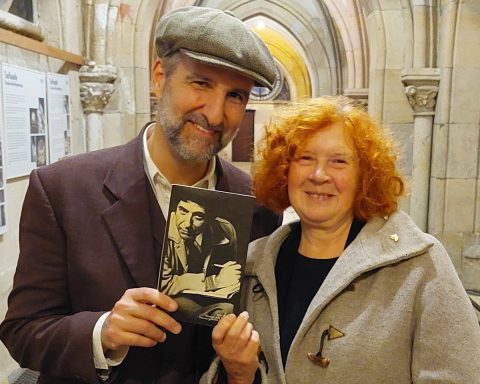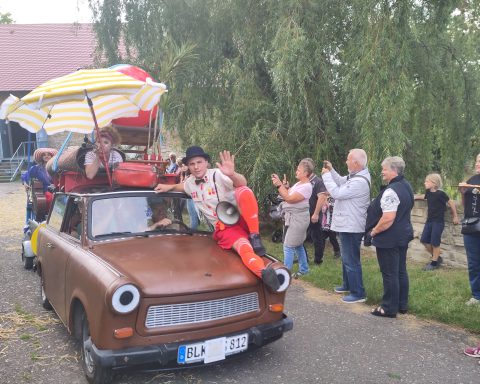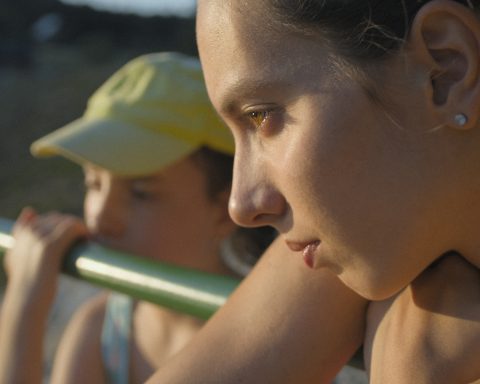LeipGlo column: Literary Parlor
The Literary Parlor is a place where we invite internationally renowned authors to share some of their insights, dig into their craft and reveal their secrets to a successful writing career. Today, we are lucky to share Svetlana Lavochkina’s interview with Theodozia Zarivna as well as four selected poems by the author.
Theodozia Zarivna is a Ukrainian poet, essayist, novelist, playwright, journalist, translator, literary and theatre critic, writer and host of literary and cultural TV programs, laureate of numerous national Ukrainian literary awards. Her translation from English into Ukrainian of Arthur Miller’s play “All My Sons” premiered in July 2017 at the Ivan Franko National Academic Drama Theater in Kyiv. Since November 2014, Theodozia Zarivna has been chief editor for the literary magazine “Kyiv” in Ukraine.
Svetlana Lavochkina: How are your poems born?
Theodozia Zarivna: It’s still a mystery to me – my poems spring into being spontaneously, just out of the blue, and, usually, for no particular reason and without any special preparation. A free verse poem is just there, suddenly, in its entirety; a rhymed one would first reveal its first stanza – and from it, you weave further lace: for hours or for a whole day. The eureka sensation briefly surfaces on the ocean of mind, and then plunges again into its depths, akin to a submarine or a whale. This is why waiting for a poem reminds me of waiting at the splashing seashore.
How does the process of creating a drama piece differ from that of writing a novel?

A play for me is a holistic discipline. I graduated from a theatre school, so I’m very acutely aware of an actor’s being on stage – she has to play, to impersonate somebody or something continually. Behind every phrase I write, I visualize the actor, I think of making her words easy to enunciate. This is the law of the stage. As for the novel – it’s complete freedom.
I love verbosity in literature and this unique opportunity for a novelist to pour her heart out.
While writing my early novels, I spent large amounts of time elaborating on the plot and its sharp turns. Yet, my recent novel, The Silence of Caesium, relates of an elderly woman living in an abandoned Chernobyl village – and this is where I allowed myself to indulge in liberty galore – after all the harnesses of rhymed verse and the unforgiving corsets of drama. It felt like kicking off high-heeled shoes to walk barefoot.
Do you have any favorite places where you fuel your inspiration?
I love my native village a lot. When I go out to the fields in August – they smell like the most exquisite, most expensive perfume – it’s a matter of seconds for my soul to get cleansed of the rust and mold accumulated in the city routine. And I love traveling. Every country you go to becomes your home, your close friend. The festive landscapes remain etched in your memory.
The more time passes, the more your memory beautifies those places with its generous brush.
You yearn for them, you want to come back, yet the sheer impossibility to return to so many countries keeps your quill (or, in my case, a simple pencil I use for writing poems) well-sharpened, and my loyal laptop is always readily at hand.
What advice would you give to aspiring poets?
Read the world poetry treasures – the great poets are magnificent teachers. And – cherish the moments when life seems like a fairy-tale, where all your dreams come true.
What is the role of muses in your work? Do you have your own muses?

There are two kinds of muses. The classic nine sisters, who assert themselves in our writing, guarding us against our desire to free ourselves from the protection of their silk robes. Of those nine sisters, my favorite one is Clio, the muse of history and lyre playing. She lives in my novels. You know, “today” is of less value than “yesterday.” “Yesterday” is always more precious, maybe because you can’t force it to come back. I like the birefringence – polarity of light in the narrative, that is, a parallel view of the present and the past – and the little historical windows into remote times and worlds. I can, for instance, spend ages finding out what type of floor there was in the palace of the Grand Prince of Kyiv – you know, in my text the heroine drops a bead from her hand, and I need to know exactly whether it hit the floor with a clink or a thump. And to find this yet, for me, evasive sound, I plow through dozens of scientific papers to discover, finally, that the floor there and then was ceramic. So the bead hit it sonorously and joyfully.
And there is another kind of muse – a real, living person who inspires, for whom you write. And this is just as beautiful, because it doesn’t matter who or what inspires you. What really matters is the process of writing – and the result.
Theodozia Zarivna
Kyiv, Ukraine
FOUR POEMS
A HOMEBOUND BIRD
Beyond the planet of dust and the infinite kingdom of swamps
lies the Empyrean Heaven, fastened by cables.
Days and dates blanched, blurred by the Past Perfect Tense –
the highly efficient mix, acetone and ethanol.
The wings knead the acres of cloudy paste,
the bird’s golden irises randomly mirror the landscape,
absorbing the sward and the bodies of water,
gliding along the stones and tin gables.
The bird calls over the fields, casting a shadow onto the highway.
What does the dull and torn cry of its narrow throat
reveal to the space within its purview?
What does the bird see from its height?
Boys in the state of nirvana? A smouldering bonfire?
The hungry grin of a fox? The shadow cast by a motionless body?
Rags fluttering? Traitor’s myopia framed in eyeglasses?
Does it hear voices announcing vengeance or wrath?
The bird proffers the sun like a yearned-for gift parcel.
Changing the light in the lens changes the snapshot:
adjusting the sharpness on shapes, quick or lifeless,
on something that trembles ever so slightly in the moribund light of X-ray,
or the night vision scope hunting those breathing and frightened –
an eye without love but with deadly resolve.
The landlord surveys his primeval demesne:
his gardens and copses boil over in yellowish foam.
The wind carries tufts of some indistinct parlance:
Turkish? Yiddish? Romani?
Tears, heavy as tar. You can’t budge a step further
without shedding them all.
AERIALISTS
In a superman’s glance, there’s a flicker of trapped despair –
a cryptic code in the thicket between the lines.
Lord, your will is not for our shoulders to carry –
fright on this backwater stage,
before people and beasts – all that meat-eating crowd.
Silence suspended along with the body under the big top:
blue spider in aerial silks, whither your dance?
Under your feet, a thousand suns, like golden Bahamas –
and you, almost speaking to gods over the floodlights,
pray for the safety line that flees into the darkness,
that is, into Gehenna. A quivery ragdoll in the mica-sharp air,
you prayed yesterday, and are praying today,
that the abyss or precipice, ravine or cave
agape over the crowd and deep in the magma,
will heal like a wound, without a trace.
The feral ringmaster weaves a wattle with words,
crossbreed predators raise their muzzles to the sky
and wait for the prey to fall down. You pray for them all
to dissolve in the air that reeks of sulphur and hydrogen,
for only land to remain: hard, sturdy dry.
REVENGE
You’ll remain in a sentence without interpunction.
Nobody’ll guess or decode a semblance.
Chained to the contents like to the ancient Ithaca,
you’ll stand in a circle of poplars on towering stilts.
I’ll leave you a dog and a couple of birds to keep you company
but not one single woman, don’t even hope.
maybe a zither or lute, and a bathing cap –
swim the infinite ocean of loneliness under the razor-sharp moon!
By the end of this poem, when all the tears have run down
in commas, in random streams, and the pulse
has been squeezed back into its Procrustean bed,
you’ll snap at God, “You are such a good author!
I read your destiny tales like detective novels,
with blood gushing about on a whim,
and yet, the tough lattice that stifles the language,
allows the air of love to seep in”.
THE BALTIC SEA
The sticky tin of the Baltic – a heavy, grey pit.
Behind the ship, time and space join in one line,
like the cardiogram of a city – a beast
stretching itself in a strip.
Moving from nowhere to nowhere, in creepy cold fright.
All is cleansed – not a scrap of paper, no stains.
Seagulls – wild hunters – melt like commas and dashes
in the strange metal sea over the isles.
Further is only the vastness, pure as a droplet of rain.
The soul, as if in the long queue to limbo, appraises its body.
All dreams are extinguished at once – the sea guzzles its sediment.
Only one dream survives: that of living.
Where the empire of marks is erased and not mentioned in vain
in this tunnel of greyness – or smoke from a chimney…
The bird calls and the lighthouse pulses with rays –
and you light up the first ray to the god of map-reading.
Translated from the Ukrainian by Svetlana Lavochkina








![Wine & Paint event on 9 Nov. 2024 at Felix Restaurant, Leipzig. Photo: Florian Reime (@reime.visuals] / Wine & Paint Leipzig](https://leipglo.com/wp-content/uploads/2024/12/pixelcut-export-e1733056018933-480x384.jpeg)
